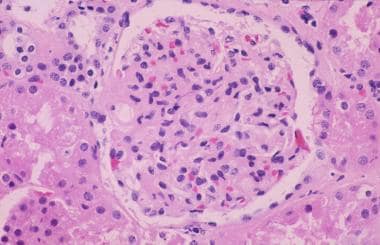Long-term outcomes in IgA nephropathy
In a recent UK study by Pitcher (2023), a large number of patients with IgA nephropathy were followed up for nearly six years (on average).

Typical glomerulus in a kidney biopsy of a patient with IgA nephropathy.
Why is this important?
IgA nephropathy is a chronic glomerulonephritis (autoimmune disease) that occurs when clumps of antibodies are deposited in your kidneys, causing inflammation and kidney damage. It can cause CKD and kidney failure in some patients. It is the commonest chronic glomerulonephritis in adults.
What did this study show?
2299 adults (and 140 children) were followed up for an average of 5.9 years. 50% of patients reached kidney failure or died in the study period. The average kidney survival was 11.4 years. The average age at kidney failure/death was 48 years, and most patients progressed to kidney failure within 10-15 years.
Almost all patients were at risk of progression to kidney failure within their expected lifetime. Average proteinuria (protein level in the urine) was linked to worse kidney survival.
Significantly, patients traditionally regarded as being lower risk (with proteinuria <100 mg/mmol), had high rates of kidney failure within 10 years.
How does this affect you?
Prognosis (outcome) in this large IgA nephropathy study was generally poor (and worse than expected). Hence, if you have IgA nephropathy, it is important to see your nephrologist regularly.
And they (and you) should focus on reducing your blood pressure, proteinuria, and modern treatments for IgA – and/or referral on to a specialist research unit. This may allow you to participate in trials of new drug treatments, some of which are very promising.
Other resource
Here is more information on IgA nephropathy.
Last Reviewed on 26 June 2024
